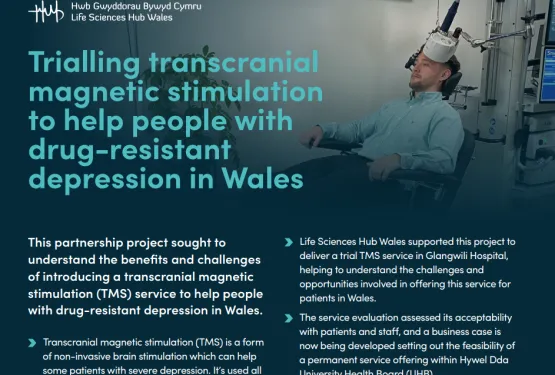Developing a robust business case
We’re now leading on the development of a detailed business case to explore the more permanent adoption of the TMS service at Hywel Dda UHB. This will lay out all the facts in terms of patient outcomes and cost effectiveness to the health board so they can make a decision about how to take it further.
“There’s already an enormous amount of evidence worldwide on the efficacy of this technology, but it’s been really interesting to explore the unique challenges and opportunities involved in delivering a service like this in Wales. We hope this will be useful for any other health boards considering similar services going forward, and it will be really interesting to see how this work develops over the coming years.”
Rhodri Griffiths, Innovation Adoption Director at Life Sciences Hub Wales
The business case will provide a factual and objective review of the benefits of implementing this kind of service, including a robust economic analysis and considering both clinical effectiveness and cost-value benefit.
Ensuring more patients in Wales can benefit from TMS technology
Mental health is a growing problem for people in Wales and it’s thought that the number of people experiencing severe mental health issues more than doubled during the pandemic (research by Cardiff University showed that the share of people in Wales reporting severe mental health problems climbed from 11.7% pre-pandemic to 28.1% by April 2020).
So it’s vital that patients have access to a range of treatments close to home, and we are keen to work with technology providers and health services to create the connections needed to see proven innovations like TMS adopted more widely.
“Mental health is a huge issue, and we particularly need solutions for clinically-resistant depression. If this kind of service were to be rolled out in Wales, it has the potential to make a real impact for some patients for whom other treatments have failed.”
Rhodri Griffiths, Innovation Adoption Director at Life Science Hub Wales
How can we help?
Our team has a wealth of experience in helping the production of business cases that drive innovation projects towards clinical adoption. If you need help developing a business case for an innovation please get in touch at hello@lshubwales.com


